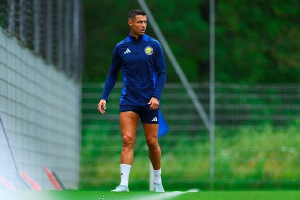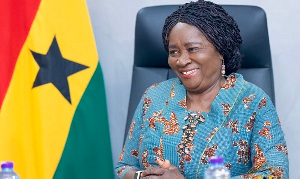Ghana needs to fix corruption and poor governance, or risk being targeted by Islamic terror groups keen to exploit inequity.
Ballot box politics is becoming a heated area of contention across the African continent. Popular uprisings in the streets and on social media are being led by women and youth in Sudan, Togo, Algeria, and Ethiopia.
Yet, while citizens are determined to protect democratic governance gains of the past 20 years, incumbent presidents and political parties continue to block reforms to curb permissive constitutional arrangements and strengthen institutional checks and balances as a way of thwarting popular aspirations.
The state of corruption
Despite the growth of democracy and the establishment of several western structured anti-corruption institutions models, corruption continues to undermine governance processes and amounts annually to over $50 billion through illicit flows and $148 billion in corruption losses.
In 2018, the Global Corruption Barometer found more than one in four people on the continent paid bribes for public services. While there has been a failure to overcome this in the past, African governments must address corruption by bolstering anti-corruption institutions, reforming judiciaries, and addressing poor governance or they risk indirectly weakening their long-term national security agendas.
A model of democracy
The Republic of Ghana is often sighted as a genuine model for democracy across Africa. Many African states accredit Kwame Nkrumah as the father of Pan-Africanism and look to Ghana for moral guidance.
Over the past 30 years, Ghana has overcome political turbulence and economic collapse to become one of the most stable and economically prosperous countries in West Africa. Ghana’s projected GDP growth rate is set at 7.5% and is the world’s fifth fastest-growing economy.
However, Ghana could see itself with other coastal countries become a hotspot for Islamic groups, if caution is not taken to clean up state corruption and its political system.
Transparency International’s Corruption Perception Index (TICPI) ranks Ghana number 78/180, with corruption strongly affecting natural resource management, the judiciary system, and the police. IMANI, a Ghanaian think tank estimated a loss of $3 billion a year to mismanagement and corruption.
Ghana alone loses about GhC 13.5 billion ($2.3bn) through corruption, with many citizens having to pay bribes before accessing basic public services.
Them versus Us Most countries operate a system where political parties in power reward supporters with state resources and contracts; Ghana is no different.
While President Akufo-Addo is working hard to implement his election pledges, namely, a factory in every district, a dam in every village, and subsidized high school education, there has been little progress in bridging the regional divide and sufficiently address corruption.
Regional disparities in Ghanaian development have grown deeper, which is nothing new for West Africa coastal countries. During colonial periods, the most developed areas of Ghana were historically the coastal areas, where merchant traders would sell goods.
Where rural development and urbanization have contributed to poverty reduction in the south, the same trends are not observed in the north.
Poverty rates have stagnated in the upper northern regions, specifically the Upper West. The absolute number of those in poverty has increased, with poverty rates remaining over 50%.
The Upper West has seen a substantial increase from 48% in 2005/2006 to 70.7% in 2016/2017.
This suggests that upper northern regions have not benefited as their southern counterparts.
Divergent paths The Republic of Ghana and the Republic of Korea maintained a similar per capita income with Ghana standing at $490 and South Korea at $491 during the time of Ghana’s independence. However, the countries’ economies diverged on their path to democratisation. South Korea’s economic growth was able to accelerate under the authoritarian regime of Park Chung Hee from 1961 and with support from the United States.
From 1975, South Korea received roughly 90% of its foreign aid from the USA and Japan with the majority of aid taking the form of grants, which contributed to lasting implications on its capacity for growth. However, what followed was embedded corruption within political institutions and co-dependency between the government and conglomerates, which South Korea continues to tackle.
Weak separation between public institutions and the private sector, which took the form of informal cooperation between the state and conglomerates in South Korea, is a systemic issue that is common in countries undergoing rapid political and economic transition. Despite this, South Korea has been on a path to reform the state, a process from which Ghana can learn. Ghana still has an opportunity to strengthen its political institutions and create a system more resilient to illicit and corrupt practices.
Early warnings The institutionalised underdevelopment of Ghana’s north is an unchecked security threat that, if left unaddressed, has the potential to evolve into an active recruitment drive, posing long-term security threat for all Ghanaians.
Corruption has the potential to further diminish and damage northern regions of Ghana, alienating an already deprived segment of the population. The surge in violent extremism confronting nearby countries such as Burkina Faso, Mali, and Niger has the potential to spread to Ghana’s northern regions. Recruitment for extremist groups is typically drawn from economically disparate segments of the population and marginalised groups/minorities.
High unemployment, religious violence/tensions, and exigent socio-economic conditions create a void where disempowered segments of the population may seek support from sources beyond the state.
Continued disparity in development and living conditions can create opportunities for segments of the population to be recruited and radicalised by violent extremist groups such as JNIM, an Al-Qaeda coalition, and the Islamic State in the Greater Sahara (ISGS) who operate in neighbouring countries.
A shadow on the horizon Ghana has a window of opportunity to set things right or risk igniting northern parts of the country to follow similar trends that occurred in northern Nigeria which later paved the wave for Boko Haram. The state’s systematic corruption and economic growth can create greater regional divides that make it easy for terrorist groups to exploit ethnic and religious differences as well as the unequal wealth distribution as a mechanism for recruitment.
Ghana has the capacity to prevent this security threat from manifesting and maturing into violence. While recent efforts to reform Ghana’s banking sector are a step in the right direction, there is still more to be done. There are several methods that may be effective in mitigating this threat such as:
-rectifying a historic imbalance in development;
-implementing systemic reform to address corruption, eliminate cronyism and influence peddling;
-allowing inclusive representation in government;
-eliminating incentivized politics.
With the impending 2020 elections, there is an opportunity for Ghanaians to truly bring corruption to the centre of the national dialogue and drive the country’s progress forward.
General News of Friday, 22 November 2019
Source: The Africa Report













